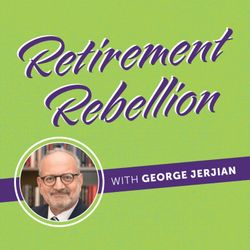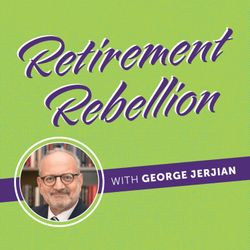Share

Retirement Rebellion with George Jerjian
Imagine what your later life would be like, if all along we got it wrong about retirement?
Latest episode

6. Mindset Masters: Ken Robinson
01:18:56||Season 1, Ep. 6Ken Robinson is a British author, speaker and international advisor on education to government, non-profits, education and arts bodies. In his book, Element: How Finding Your Passion Changes Everything, Robinson considers the child bored in class, the disillusioned employee and those of us who feel frustrated but can't quite explain why: and shows how we all need to reach our ‘Element’, the point at which natural talent meets personal passion.In this month’s podcast, I cover a large part of the book in more detail, and consider how Robinson’s ideas can be used at retirement age.
More episodes
View all episodes

5. Mindset Masters: Eckhart Tolle
01:12:28||Season 1, Ep. 5Eckhart Tolle is a German-born resident of Canada and a celebrated spiritual teacher. In 2008, The New York Times described him as "the most popular spiritual author in the United States". In his book, The Power of Now: A Guide to Spiritual Enlightenment, Tolle demonstrates how to live a healthier, happier, mindful life by living in the present moment. In this month’s podcast, I cover the entire book in more detail, and consider how Tolle’s ideas can help us to lead a life of passion and purpose at retirement age.
4. Mindset Masters: Brené Brown
01:12:31||Season 1, Ep. 4This month, I’m looking at Brené Brown’s “Daring Greatly: How the Courage to Be Vulnerable Transforms the Way We Live, Love, Parent, and Lead.” Brené Brown, PhD is a research professor at the University of Houston. She has spent the last two decades studying courage, vulnerability, shame and empathy, and is the author of four Number 1 New York Times bestsellers.In Daring Greatly, Brown offers a transformative new vision for the way we lead, love, work, parent, and educate - that teaches us the power of vulnerability. In my podcast, I cover the entire book in more detail, and consider how Brown’s ideas can make a difference to us in later life.
3. Mindset Masters: Joe Dispenza
01:15:55||Season 1, Ep. 3In this third episode, I delve into Dr Joe Dispenza’s “Breaking the Habit of Being Yourself: How to lose your mind and create a new one.” Dr Dispenza studied biochemistry with an emphasis on neuro-chemistry at Rutgers University and earned his Doctor of Chiropractic degree from Life University in Atlanta Georgia. I cover 8 main ideas from Dr Dispenza’s book and, with reflection and questions, apply his thinking to how that impacts on life after retirement and in so doing challenge not only preconceived ideas but also elicit new possibilities for life beyond retirement.In Breaking the Habit of Being Yourself, Dr Dispenza provides and entertaining and highly accessible manual for rewiring our mental and emotional circuitry, which offers a simple but potent message: what we think today determines how you live tomorrow.
2. Mindset Masters: Dr Bruce Lipton
45:39||Season 1, Ep. 2In this podcast I’m looking at a more recent work, delving into Dr Bruce Lipton’s “The Biology of Belief.” Dr Bruce Lipton is a renowned cell biologist by training who taught cell biology at the University of Wisconsin School of Medicine and later performed pioneering studies at Stanford University School of Medicine. In “The Biology of Belief” Dr Lipton explains how our knowledge of our bodies and our biology is crucial in understanding how thinking can affect change, and impact on our circumstances, our health, our purpose and our life in general.In my podcast, I cover seven ideas from Dr Lipton’s book and, with reflection, apply his thinking to how that impacts on life after retirement.
1. Mindset Masters: James Allen
21:55||Season 1, Ep. 1In this first episode, George Jerjian delves into James Allen’s As a Man Thinketh, which was published in 1903. Allen explains how our thinking can affect change, and impact on our circumstances, our health, our purpose, our achievements, and our vision and ideals. George asks probing questions on how thinking impacts on retirement.